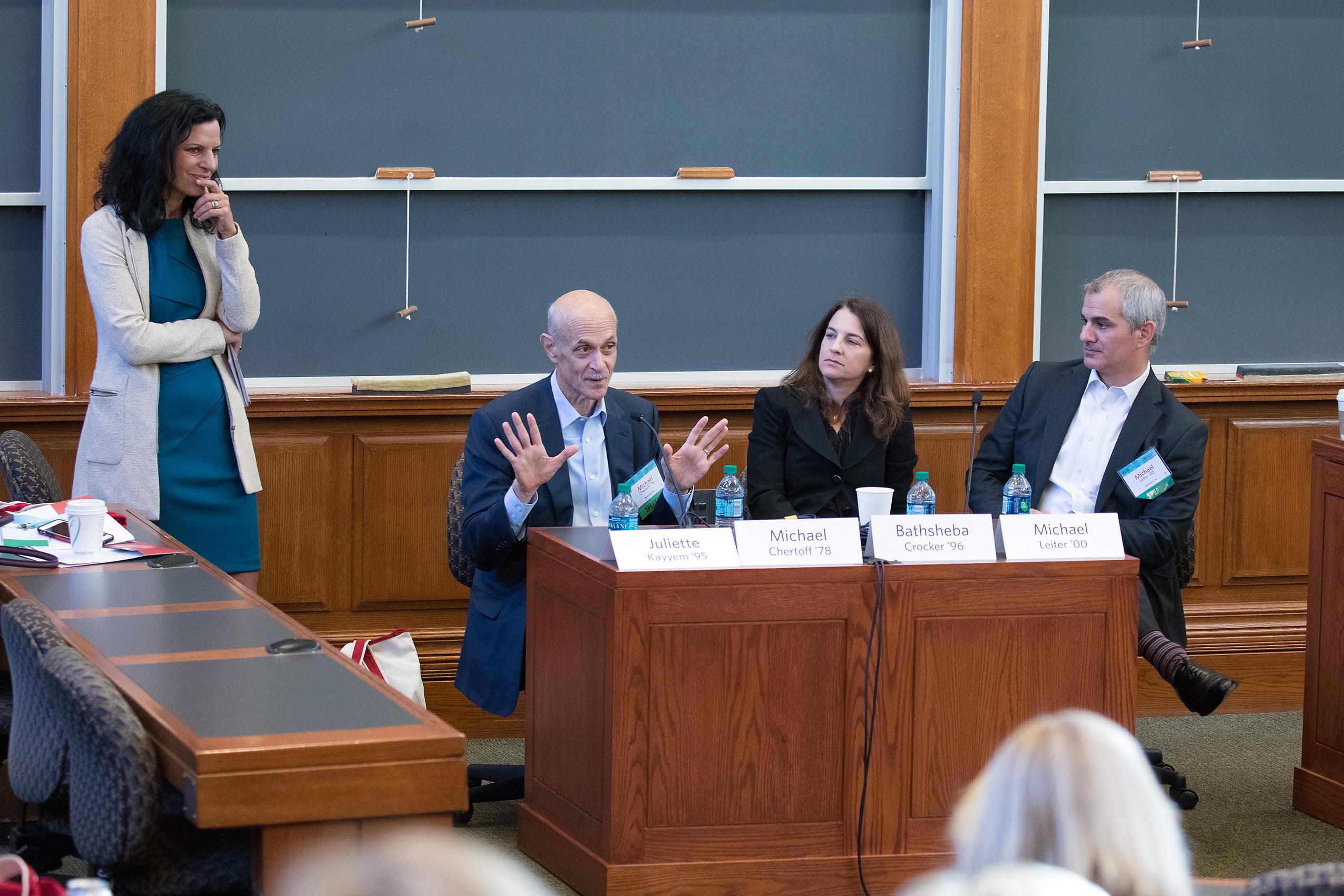“Our political system is remarkably terrible at judging threats and risk,” said Michael Leiter ’00, former director of the United States National Counterterrorism Center, broaching the myriad existential threats facing contemporary society to a packed room in Austin Hall Friday morning. His remarks helped open A World (Dis)order, a panel exploring the vulnerabilities of globalization and a changing world that, over the course of 90 minutes, touched issues including climate change, cybersecurity, North Korea, ISIS, populism and authoritarianism.
The panel, part of a two-day event commemorating the Harvard Law School bicentennial, featured three national security experts: Michael Chertoff’ 78, former U.S. secretary of homeland security; Bathsheba Crocker ’96, former assistant secretary of state for international organization affairs; and Leiter, who is now senior national security and cybersecurity analyst at NBC.
The panelists highlighted cyberattacks and climate change as immediate threats to national security in a post-9/11 world. But in considering more existential threats, all circled back to domestic concerns that Crocker summarized as “a breakdown or undermining of institutions and laws and norms that have guided not only our political discourse and civil discourse in this country but also relations between countries around the world.”
Crocker highlighted how domestic politics have impacted the country’s international standing, describing a recent United Nations trip: “It was unbelievably striking to me how absent the [United States] is from the conversation.” Under the current administration, those in the foreign policy sphere may find it tempting to “stick our head in the sand for the next three years and hope this is all okay at the end,” she noted. That attitude gives the country’s enemies “a lot more room for mischief.”
Crocker compared this attitude to her previous experience representing the country on the world stage — she recalled the country’s former role as a leader, advocating for facts, pursuing action and commanding the respect of others.
This theme — that the political environment has debilitated the country’s capacity to respond to the multitude of national security issues it faces — resurfaced throughout the discussion. The country’s disengagement has been apparent in climate change — with the administration’s decision to pull out of the Paris Agreement, the landmark international climate change accord — as well as its pullback in aid, which gives ample room for countries like China and Russia to curry favor in developing countries. Chertoff also pointed to the elevated risk that the administration might overreact to a domestic terror attack or provocation from North Korea.
The uncertainty surrounding the United States’ place on the world stage stands in contrast to the “end of history” mentality that immediately followed the Cold War, in which the U.S. seemed like the last world power standing, the panelists noted. Now, Chertoff said, there is no longer a clear arc of history bending toward liberal democracy. Instead, Chertoff listed alternatives to the American model that have arisen since the turn of the century: the results-driven Chinese model; gangster-style, proto-fascist Putinism; and religious fundamentalism. These alternatives might be appealing alternatives to American-style democracy from the perspective of developing countries, he noted. “We have to start thinking about fighting for our values.”
Despite these existential concerns, the panelists found hope during the question-and-answer segment in the next generation of political leaders, whom Crocker described as more policy-focused and potentially better equipped to bridge the partisan divide in the name of pragmatic solutions. The test, Crocker said, will be whether these individuals can be elected in the current political environment. While Congress has been able to offer a limited check on the executive — particularly in passing sanctions on Russia and working to uphold the previous administration’s agreement with Iran — some moderate and policy-driven leaders have wilted in the face of the populist wave that drove the current president to power
